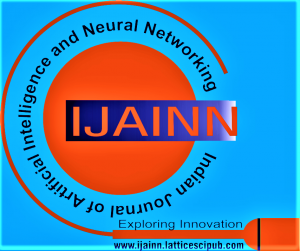![]()
Artificial Intelligence in Energy Research and Climate Change
S. J. Haider1, Vijay Kumar Srivastava2, Baleshwar Kumar3, Syed Zaheer Hasan4
1S. J. Haider, S. J. Haider, K-10, Sector-19, Gandhinagar-382019, Gujarat, India.
2Prof. Vijay Kumar Srivastava, Former Vice Chancellor, Sankalchand Patel University, Ambaji-Gandhinagar State Highway, Visnagar (Gujarat), India.
3Dr. Baleshwar Kumar, Former Chief Scientist, NGRI, 5 / 80-A, V. V. Nagar, Street No., Habshiguda, Hyderabad (Telangana), India.
4Dr. Syed Zaheer Hasan, Gujarat Energy Research and Management Institute, First Floor, Energy Building, PDEU Campus, Raisan, Gandhinagar (Gujarat), India.
Manuscript received on 07 July 2025 | Manuscript Accepted on 15 August 2025 | Manuscript published on 30 August 2025 | PP: 4-7 | Volume-5 Issue-5, August 2025 | Retrieval Number: 100.1/ijainn.E110405050825 | DOI: 10.54105/ijainn.E1104.05050825
Open Access | Editorial and Publishing Policies | Cite | Zenodo | OJS | Indexing and Abstracting
© The Authors. Published by Lattice Science Publication (LSP). This is an open-access article under the CC-BY-NC-ND license (http://creativecommons.org/licenses/by-nc-nd/4.0/)
Abstract: Artificial intelligence (AI) plays a pivotal role in addressing climate change by accelerating energy research and aligning with global initiatives towards a sustainable future, with a notable focus on India, the world’s fourth-largest economy, which is on track to become the third-largest economy. As a developing nation struggling with energy demand and climate adaptation/resilience, India stands at the convergence of innovation and necessity. This research paper presents the integration of AI technologies in optimising energy resources and enhancing grid efficiency in relation to climate patterns. Leveraging AI-driven solutions, one can transform the Indian energy sector by predicting energy demand/consumption, managing resources, and minimising carbon footprints. AI shall / may transform energy research in the following direction.
▪ Smart grids and energy optimization
▪ Energy distribution efficiency
▪ Reducing losses through integration with clean and renewable energy resources
India, with its continued excellence in science and technology, needs to play a leading role in global AI collaborations. This association involves the inclusion of globally renowned organisations, such as the United Nations Development Programme (UNDP), the International Energy Agency (IEA), and the Conference of the Parties (COP) under the banner of the United Nations Framework Convention on Climate Change (UNFCCC), considering all aspects that govern solutions for global climate change through AI. The methodological approach focuses on accelerating the integration of artificial intelligence in managing energy resources and addressing climate change. Last but not least, AI can be considered an effective and affordable system-based tool that, along with emerging technologies, effectively addresses the challenges of climate change mitigation plans.
Keywords: Climate Change, Data Modelling, Energy Efficiency, Renewable Energy, Future Prediction.
Scope of the Article: Artificial Intelligence Algorithms
